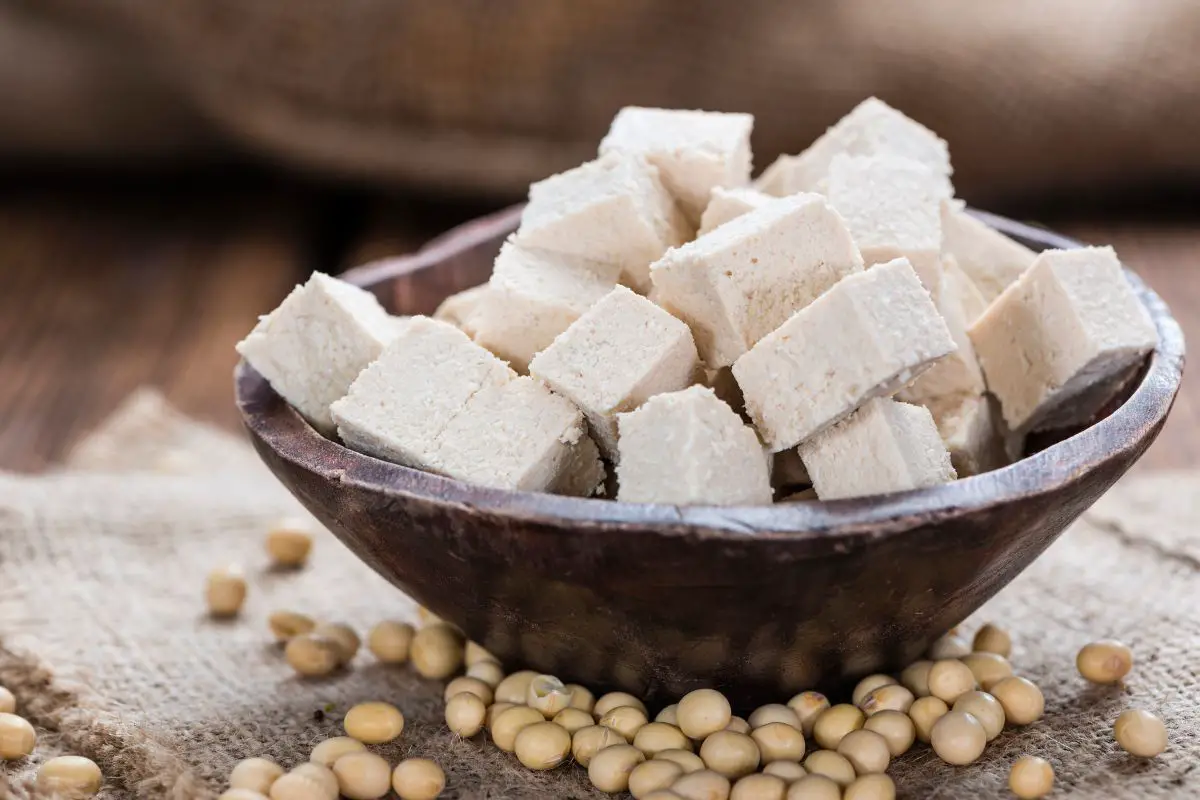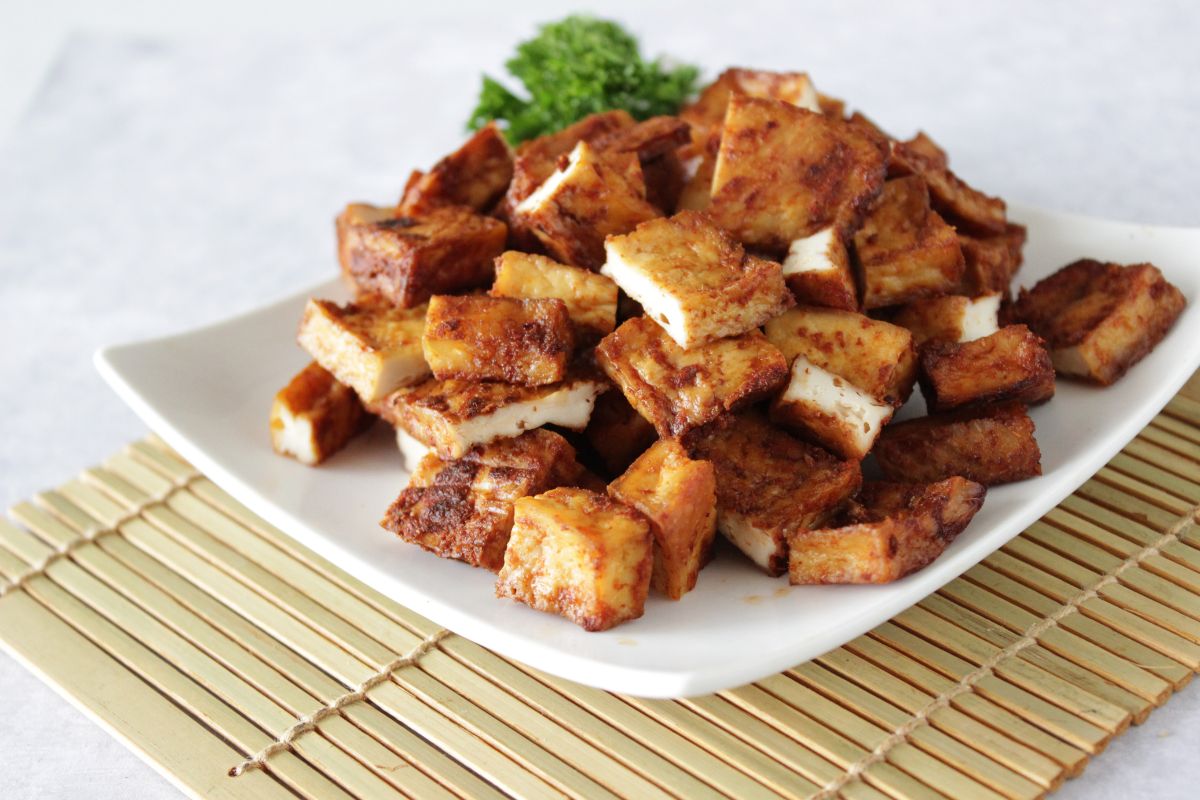
Vegan and vegetarian alternatives have become a lot more advanced in recent years.
With more and more high-street brands creating vegan and veggie alternatives for their meat or animal-based products, suddenly those following these diets have a lot of options to choose from.
However, in the past, the only vegan or vegetarian alternative was tofu.
Tofu has existed for many years. In the Western world, this food is mainly associated with a plant-based diet.
However, in China (where tofu was created), tofu has lots of different uses in lots of different meals. So no matter whether, or not, you eat meat, you will likely encounter tofu if you visit China.
As tofu is often enjoyed as part of a vegetarian diet, you might expect it to be a healthy alternative. So, if you follow a keto diet, you might find yourself wondering if tofu is ketogenic.
In this complete guide, we’re taking a look at whether, or not, tofu is ketogenic. Read on to find out more!
What Is Tofu?
First things first, let’s take a look at what tofu is. A lot of people have consumed tofu but are still unsure what this food is actually made of.
Tofu is very popular among those following a vegan or vegetarian diet, so it is clear that it doesn’t contain meat, but what exactly does tofu consist of? Let’s take a look.
Tofu is commonly known in China as bean curd, and that is why it is so widely enjoyed. Tofu is created using soybeans and is actually made by coagulating soy milk.
Once coagulated, the soy milk is pressed so that the curds form blocks. It is the blocks that are then enjoyed as tofu.
Tofu comes in a variety of different styles, and these different styles depend on the firmness of the tofu.
Different firmness options are created through the pressing process. Tofu that is heavily processed will be a lot firmer, while tofu that is lightly pressed will be much less firm.
Generally, when buying tofu you have a couple of different options to choose from. You can choose between silken, soft, firm, and extra firm tofu.
Within these different types, you will also find lots of different varieties of the original recipe.
So, there are lots of different types of tofu to choose from. With that in mind, let’s take a look at the nutritional value of tofu.
Nutritional Information About Tofu
As tofu is often consumed as a vegan and vegetarian-friendly alternative to meat in a lot of dishes, many people assume that this food is very healthy.
How healthy tofu actually is is something that is debatable. The high level of soy found in tofu is somewhat controversial, and this does impact a lot of people’s opinions on the food.
However, the nutritional information for this food really speaks for itself.
How healthy your tofu is will depend on a variety of different things.
Things such as how you prepare the tofu, the type of tofu you eat, and how you can cook it will have a big impact on how healthy it is.
But, to give a fair overview of the nutritional value of tofu, we’ve included the basic nutritional information for tofu below.

Regular tofu with a medium firmness will contain the following nutrients (in a 100-gram portion):
- Calories – 76 calories
- Fat – 4.78 grams
- Carbohydrates – 1.87 grams
- Fiber – 0.3 grams
- Protein – 8.08 grams
- Net Carbohydrates – 1.57 grams
As you can see from the nutritional information above, there are a lot of nutrients in a single portion of tofu.
So, it is easy to see why some people choose to eat it. However, do these nutrients make this food healthy? That’s a very good question! Let’s take a look.
Is Tofu Healthy To Eat?
Now that we have taken a look at the nutritional value of tofu, let’s take a look at whether, or not, it is actually healthy to eat.
There is no denying that there are a lot of benefits to be found in tofu because of the nutrients in this food. But can it actually be consumed as part of a healthy diet? That’s a good question!
Based on nutritional value alone, it is easy to assume that tofu is safe to consume. However, there is some debate about this.
This debate generally surrounds the fact that tofu is made using soy.
As soy is used to create tofu, it is naturally very high in soy, and there is a lot of debate around whether, or not, it is safe to consume a large amount of tofu.
Consuming high amounts of soy has been associated with causing hormonal imbalances. That is because soy contains chemicals that cause a similar reaction in the body to estrogen.
So, consuming a large amount of soy could trigger a reaction in your body that totally impacts your hormones.
This is the main reason why a lot of people avoid soy when following a keto diet. Let’s take a look at whether, or not,
Is Tofu Suitable For A Ketogenic Diet?

Finally, let’s take a look at whether, or not, tofu is suitable for a ketogenic diet. This is something that is very heavily debated.
Based on nutritional value alone, it is easy to see that tofu could slot into a keto diet.
The nutritional information is almost perfect for a ketogenic diet, however, there is one issue with this.
That is the fact that eating large amounts of soy (something that tofu is incredibly high in) is associated with causing hormonal imbalances.
It is almost impossible to get naturally grown soybeans. Instead, the majority of soybeans (around 94%) are genetically modified.
So when you consume tofu, there is a very high chance that you are consuming genetically modified food.
This isn’t really suitable for a ketogenic diet and is one of the many reasons why a lot of people following a keto diet don’t eat tofu.
Another reason why people avoid eating tofu is that soy is a legume.
Legumes generally aren’t consumed as part of a strict ketogenic diet, so eating soy isn’t something that you should really do.
However, Some people are happy to break this rule as tofu is very different from soy in its most basic form.
Ultimately, whether, or not tofu is suitable for a ketogenic diet will depend on your own personal preference and beliefs, including how strictly you follow the diet.
Summary
In short, there is a lot of debate surrounding whether, or not, tofu is suitable for those following a ketogenic diet.
That is because tofu is a food that is incredibly high in soy, and the consumption of large amounts of soy is heavily debated.
There is a lot of debate regarding whether, or not, the benefits of consuming high amounts of soy outweigh the drawbacks.
For that very reason, people who follow very strict keto diets generally will avoid consuming tofu.
However, some people who follow less strict ketogenic diets will consume a small amount of tofu as part of their diet.
So, ultimately, it is impossible to say for certain whether, or not, tofu is suitable for those following a keto diet.
That is because it will ultimately depend on how strictly you follow this diet plan.
Thanks for reading!
Frequently Asked Questions
There is a lot of confusion regarding whether, or not, soy can be consumed as part of a keto diet.
Technically speaking, there is nothing preventing you from consuming soy as part of a keto diet.
However, some keto-followers will avoid soy as it is high in estrogen-like nutrients that can affect hormone levels.
This in turn can have an effect on your diet if you are following a keto diet.
If you typically consume a lot of tofu, then it can be quite jarring to hear some people say that you cannot consume this as part of a keto diet.
Thankfully, there are plenty of keto-friendly substitutes for tofu.
Some of the best keto substitutes for tofu include seitan and tempeh. However, it is worth noting that you could eat tofu as part of a keto diet if you were to only consume a small amount.
Consuming a large amount of tofu isn’t ideal due to the impact that this food can have on your hormone levels.
The importance of this will depend on the reason why you are following a keto diet.





